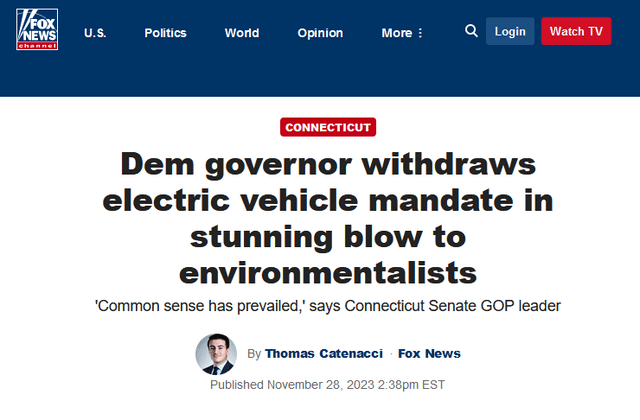Auto Dealers Double Down On Opposition To Electric Vehicle Requirements

Table of Contents
Financial Concerns and Infrastructure Challenges
The transition to an EV-centric market presents significant financial hurdles for auto dealers, threatening established business models and profitability.
Impact on Profit Margins
Auto dealers traditionally rely heavily on the substantial revenue generated from the service and parts departments of internal combustion engine (ICE) vehicles. This revenue stream is far less lucrative with EVs.
- Lower Service Revenue: EVs have fewer moving parts and require significantly less frequent maintenance than ICE vehicles, directly impacting service department income.
- Reduced Parts Sales: The simplicity of EV mechanics translates to fewer replacement parts needed, further diminishing revenue.
- High Initial Investment: Adapting to the EV era demands considerable investment in new tools, training for technicians specializing in EV repair, and potentially even the installation of charging stations on dealership premises. This capital expenditure can strain already tight profit margins.
Lack of EV Infrastructure
The widespread adoption of EVs hinges on the availability of robust charging infrastructure. The current landscape falls short, impacting both consumer confidence and dealer preparedness.
- Insufficient Public Charging: A lack of readily accessible and reliable public charging stations deters potential EV buyers concerned about range anxiety and charging convenience.
- Dealer Infrastructure Limitations: Many dealerships lack the space and resources necessary to install large-scale charging facilities on their premises, hindering their ability to fully support EV sales and service.
- Uneven Geographic Distribution: The existing charging infrastructure is unevenly distributed across regions, further exacerbating the challenges for both consumers and dealerships in less-developed areas.
Consumer Demand and Market Readiness
While the push towards EVs is undeniable, arguments persist regarding the current level of consumer demand and the overall readiness of the market.
Limited Consumer Interest in EVs
Some argue that the current consumer demand for EVs doesn't justify mandatory requirements.
- Lower Market Share: While EV sales are growing, their market share remains relatively small compared to ICE vehicles, suggesting a significant portion of consumers are not yet ready to embrace electric mobility.
- Consumer Concerns: Factors such as range anxiety (fear of running out of battery power), longer charging times compared to refueling, and higher upfront purchase costs continue to deter many potential buyers.
- Preference for Familiar Technology: Many consumers remain comfortable with established ICE vehicle technology and are hesitant to adopt new technologies.
Lack of EV Model Diversity
The limited range of EV models available presents another challenge.
- Price Point Limitations: Current EV models tend to be concentrated in the higher price ranges, leaving a significant gap in the market for affordable electric options.
- Limited Body Styles: The selection of EV body styles is also relatively narrow, lacking the diversity found in the ICE vehicle market, especially in segments like pickup trucks and larger SUVs.
- Inventory Management Challenges: Dealers struggle with effectively managing inventory due to the limited model availability, impacting their ability to meet diverse customer preferences.
Political and Lobbying Efforts
Auto dealer associations are actively engaging in political lobbying efforts to influence policy-makers and mitigate the impact of EV mandates.
Powerful Lobbying Groups
The automotive retail sector wields significant political influence through powerful lobbying groups.
- Organized Opposition: National and regional auto dealer associations are actively campaigning against mandatory EV requirements, leveraging their financial resources and political connections.
- Influence on Legislation: Their efforts have a measurable impact on legislative decisions, delaying or weakening proposed regulations promoting EV adoption.
- Strategic Partnerships: They form alliances with other industry stakeholders to amplify their message and maximize their political influence.
Arguments Against Government Intervention
Auto dealers counter government mandates by arguing for a market-driven approach to EV adoption.
- Market-Based Solutions: They advocate for allowing market forces to dictate the pace of EV adoption rather than imposing government-imposed deadlines.
- Job Loss Concerns: Dealers raise concerns about potential job losses in the ICE vehicle sector due to rapid EV adoption, demanding a more gradual transition.
- Economic Impact: They emphasize the potential economic disruption that aggressive EV mandates might cause, particularly for smaller dealerships.
Conclusion
Auto dealers' opposition to electric vehicle requirements stems from a confluence of factors: significant financial concerns, limitations in charging infrastructure, perceived insufficient consumer demand, and robust political lobbying efforts. The debate surrounding mandatory electric vehicle requirements is far from over. Understanding the perspectives of auto dealers—and the complexities of transitioning to a cleaner energy future—is crucial for developing effective policies that support both environmental goals and the economic stability of the automotive industry. Further discussion and collaboration are needed to find solutions that address the concerns surrounding electric vehicle mandates, ensuring a smooth transition to a sustainable future. We encourage further research on the impact of EV mandates and exploring alternative policies to accelerate the adoption of electric vehicles while mitigating the challenges faced by the automotive retail sector.

Featured Posts
-
 Understanding The Value Proposition Of Middle Management Benefits For Companies And Their Staff
Apr 24, 2025
Understanding The Value Proposition Of Middle Management Benefits For Companies And Their Staff
Apr 24, 2025 -
 Metas Future Under A Trump Administration Zuckerbergs Challenges And Opportunities
Apr 24, 2025
Metas Future Under A Trump Administration Zuckerbergs Challenges And Opportunities
Apr 24, 2025 -
 Elon Musks Dogecoin Strategy After The Epas Tesla And Space X Investigation
Apr 24, 2025
Elon Musks Dogecoin Strategy After The Epas Tesla And Space X Investigation
Apr 24, 2025 -
 Ella Bleu Travoltas Dazzling Makeover At 24 A New Era For The Travolta Daughter
Apr 24, 2025
Ella Bleu Travoltas Dazzling Makeover At 24 A New Era For The Travolta Daughter
Apr 24, 2025 -
 Spot Market For Russian Gas Eus Phaseout Strategy Under Scrutiny
Apr 24, 2025
Spot Market For Russian Gas Eus Phaseout Strategy Under Scrutiny
Apr 24, 2025
